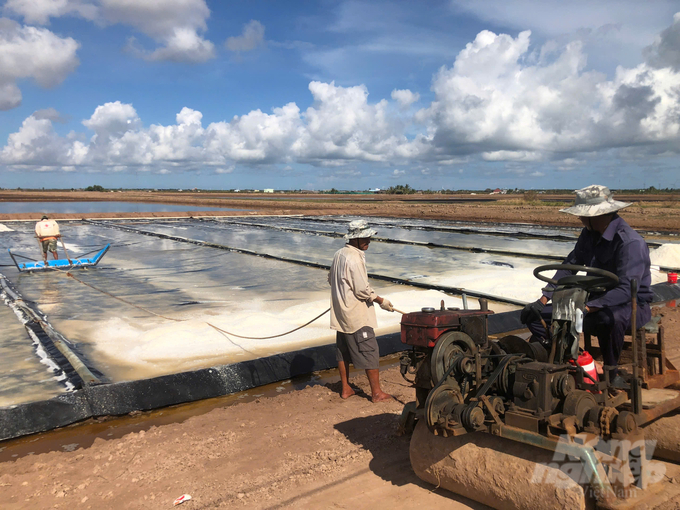May 20, 2025 | 21:57 GMT +7
May 20, 2025 | 21:57 GMT +7
Hotline: 0913.378.918
May 20, 2025 | 21:57 GMT +7
Hotline: 0913.378.918

Salt farming is hard work and income is unstable. Photo: Trong Linh.
In accordance with the Vietnam – Bac Lieu Salt Craft Festival 2025, the National Agricultural Extension Center (NAEC) will collaborate with the People's Committee of Bac Lieu province to conduct a seminar on "The integration of science and technology into salt production to address climate change."
Hoang Van Hong, the Deputy Director of NAEC, stated that the salt craft is still laborious and primarily dependent on the weather, resulting in an unstable income for salt producers. At present, the majority of salt production phases are manual, resulting in a low output and a laborious process.
Consequently, in order to establish a sustainable salt production system, the linkage and consumption between salt producers and processing enterprises serve as precedents. Enhancing the grade of the products and establishing appropriate pricing are among the most critical factors.
In the near future, salt production initiatives will prioritize the implementation of technological innovations to increase productivity and elevate the value of salt. The introduction of mechanization into salt production will be accompanied by initiatives to fortify linkages, consumption, and the further development of craft village tourism. The Pilot Project on Integrating Salt Production with Rural and Resort Tourism, the Development of Salt Production and Processing Models Associated with OCOP Product Development and Geographical Indications, and the Vietnam Salt Branding and Export-Oriented Production Development Project are among the most notable projects.
Nguyen Trung Hieu, the Deputy Director of the Department of Agriculture and Environment of Bac Lieu Province, acknowledged that the salt production industry in Bac Lieu Province has substantial potential and advantages. However, the industry continues to encounter numerous obstacles. The labor efforts of salt farmers are not commensurate with their compensation. Due to its dependence on traders, salt prices are constantly fluctuating, and its production is wholly contingent upon weather conditions. In addition, the salt fields of Bac Lieu are located on fragile alluvial soil, which necessitates an annual investment in land development, resulting in elevated production costs. This, in turn, diminishes the competitiveness of Bac Lieu's salt and impacts the ultimate product price.

Bac Lieu salt farmers apply mechanization to salt production. Photo: Trong Linh.
Tran Viet Trung, a salt farmer from Long Dien Dong Commune, Dong Hai District (Bac Lieu), stated that the majority of salt farmers have limited access to capital, which makes it challenging to incorporate science and technology into their salt production.
"Capital is indispensable for the expansion of production, the integration of machinery, and the implementation of scientific and technological advancements, despite the fact that every salt farmer is aware of the process of salt production. Nevertheless,the instability of salt prices and the difficulty of accessing financial resources continue to be a significant obstacle", Trung noted.
Furthermore, representatives from salt cooperatives, salt producers, and enterprises have suggested a variety of solutions to enhance salt production. In particular, they underscored the necessity of infrastructure investment, particularly in irrigation systems to direct seawater to salt fields and in transportation infrastructure to streamline product distribution.
Bac Lieu Province boasts a salt production area of more than 1,450 hectares, with over 250 hectares employing the crystallization tarpaulin method. The tarpaulin method yielded 21 to 107 tons per hectare, while the traditional production methods yielded 10 to 47.7 tons per hectare from 2020 to 2024. Production was significantly influenced by weather conditions. Presently, the province is home to 776 households that produce salt, which accounts for over 800 employees.
Huynh Chi Nguyen, Vice Chairman of the People's Committee of Bac Lieu Province, confirmed that salt production is essential for the economic health and livelihoods of numerous coastal communities. Nevertheless, climate change is having a substantial adverse effect on the production of salt, directly influencing both the quantity and quality of the commodity. Consequently, the application of science and technology to the production of salt has become an imperative necessity.
For their practical insights and recommendations, Le Duc Thinh, Director of the Department of Cooperative Economy and Rural Development, conveyed his gratitude to stakeholders, businesses, local authorities, and salt farmers. In the near future, the relevant authorities will compile and forward these proposals to the appropriate ministries and agencies. This will lead to the development of new policies and objectives that will create a more conducive production environment for salt producers.
Translated by Linh Linh

(VAN) Dong Thap farmers attained an average profit margin of 64% during the summer-autumn 2024 crop (first season), while An Giang and Kien Giang farmers followed with 56% and 54%, respectively.

(VAN) As a doctoral student doing research on renewable energy and electrification at Harvard University, the author shares his musings on electricity, nature, and countryside memories.

(VAN) The decree on Extended Producer Responsibility (EPR) ensures transparent management and disbursement of support funds, avoiding the creation of a “give-and-take” mechanism.

(VAN) Hue City rigorously enforces regulations regarding marine fishing and resource exploitation, with a particular emphasis on the monitoring of fishing vessels to prevent illegal, unreported, and unregulated (IUU) fishing.

(VAN) Hanoi People's Committee has issued a plan on reducing greenhouse gas emissions in the waste management sector with 2030 vision.

(VAN) Vietnam's draft amendment to Decree No. 156 proposes a mechanism for medicinal herb farming under forest canopies, linking economic development to population retention and the sustainable protection and development of forests.

(VAN) In reality, many craft village models combined with tourism in Son La have proven effective, bringing significant economic benefits to rural communities.